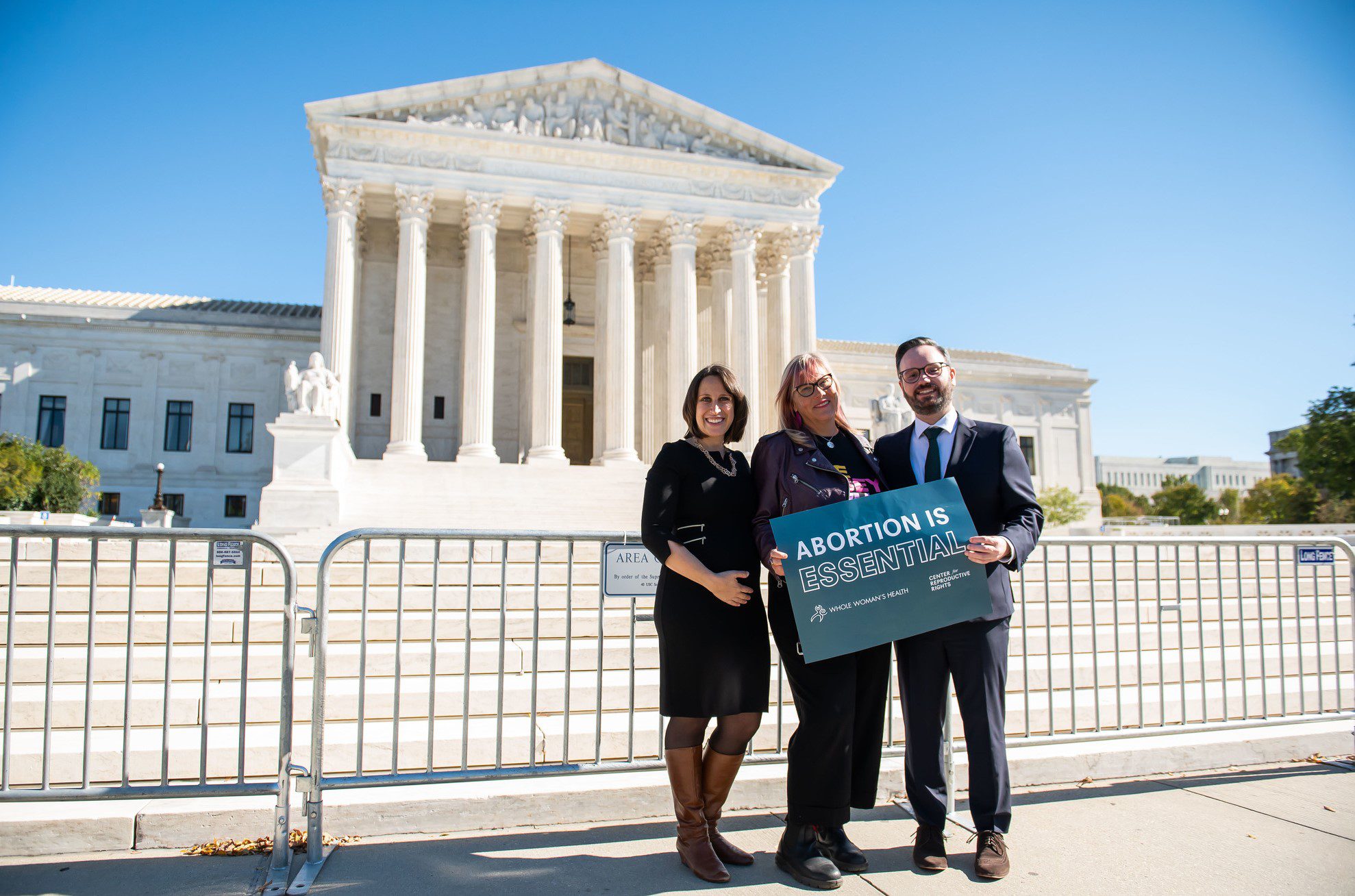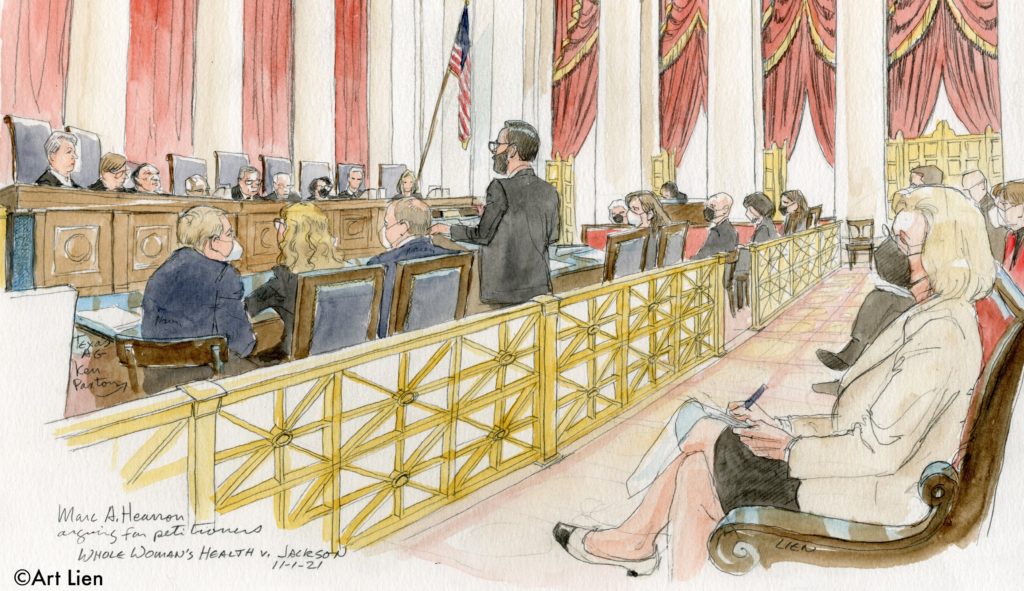Whole Woman's Health v. Jackson
At Supreme Court, Texas Scheme to Evade Review of Abortion Ban Raises Questions from Justices
Center presents oral arguments in Whole Woman’s Health v. Jackson, its case against Texas law S.B. 8.

“S.B. 8 is an abortion prohibition, but the issues before this Court are far more sweeping,” said Marc Hearron, Senior Counsel of the Center for Reproductive Rights, during oral arguments at the U.S. Supreme Court November 1 in a case challenging a Texas abortion ban. “To allow Texas’s scheme to stand would provide a roadmap for other states to abrogate any decision of this Court with which they disagree. At issue here is nothing less than the supremacy of federal law,” he continued.
S.B. 8 bans abortion care after approximately six weeks of pregnancy, and since taking effect on September 1, it has ended most abortion access in the state.
But the law was also designed to skirt judicial review by incentivizing individuals—including anti-abortion activists—to bring costly and harassing lawsuits against anyone who provides abortion care or assists someone in obtaining an abortion in violation of the ban. The Texas scheme—not the right to abortion itself—was the issue before the Court on November 1 in the Center’s case, Whole Woman’s Health v. Jackson.
In the case, the Court will decide whether federal courts have the power to review Texas’s abortion ban, which prohibits the exercise of a constitutional right by delegating to the general public the authority to enforce that prohibition.
Because the Court decided to have briefing and oral arguments at an extremely fast pace—only 10 days—a decision could come quickly, or it may be issued later in the term.
Whole Woman’s Health v. Jackson was brought by the Center and its partners on behalf of Texas abortion providers led by Whole Woman’s Health and other independent abortion clinics, doctors, clinic staff, abortion funds, support networks, and clergy members.
Hearron presented the Center’s main arguments to the Court:
- S.B. 8 nullifies a constitutional right and prevents state and federal court review of the state’s actions in doing so because of its unique procedural rules.
- The Supreme Court needs to take prompt action because of the chilling effect of the potential lawsuits against everyone involved in abortion in any way and the demonstrated impact on people seeking abortions in Texas after six weeks.

During oral arguments, the justices’ questions focused on interpretations and intricacies of applicable laws and past cases regarding federal and state review, the Texas law’s provisions to evade review, and the lack of options for relief available to those sued under the law.
In-depth discussion with the justices centered on:
- The unique provisions of Texas S.B. 8, which make it impossible to get a final and fair judgment on the constitutional questions at issue in the state courts.
- How S.B. 8’s modification of ordinary legal processes in Texas state courts weaponize the state court system against plaintiffs and make state court an inadequate forum for vindicating constitutional rights.
- The risks and the ruinous penalties imposed by the law on all parties involved in the provision of each abortion, including the physician, nurse, staff member, security guard, and many others.
Highlights from the justices included:
- Justice Amy Coney Barrett said the law was structured to prevent the providers from presenting a “full constitutional defense,” taking issue with the state’s assertion that providers could adequately challenge the law by violating it, getting sued and defending themselves by arguing that the law is unconstitutional.
- Justice Elena Kagan said the procedural questions obscured the bottom line that, as Kavanaugh had noted, Texas officials were trying to exploit a loophole. “The fact that after all these many years, some geniuses came up with a way to evade the commands of” an important precedent, and “the even broader principle that states are not to nullify federal constitutional rights and to say, ‘Oh, we’ve never seen this before, so we can’t do anything about it’ — I guess I just don’t understand the argument.”
- Chief Justice John Roberts questioned the state’s contention that abortion providers should be willing to risk a trip to court to prove the law unconstitutional. “Assume that the bounty is not $10,000 but a million dollars. Do you think in that case the chill on the conduct at issue here would be sufficient to allow federal court review prior to the end of the state court process?” Texas Solicitor General Judd Stone replied no.
- Justice Brett Kavanaugh expressed concern that states could enact other laws structured like this Texas law, which could infringe on other constitutional rights, commenting, “The amicus brief of the Firearms Policy Coalition says, ‘This will easily become the model for suppression of other constitutional rights, with Second Amendment rights being the most likely targets.’ And it could be free speech rights. It could be free exercise of religion rights. It could be Second Amendment rights. If this position is accepted here, the theory of the amicus brief is that it can be easily replicated in other states that disfavor other constitutional rights.”
After oral arguments, Hearron commented, “We of course can’t predict how the Court will rule in this case–but we are encouraged that the justices’ questions seemed to show they had real concerns about how destructive and unconstitutional the Texas law is and how it was designed specifically to evade court review and deny people their constitutional rights.” He continued, “We look forward to the Court’s decision and to continuing our fight against this extreme abortion ban so Texans can once again exercise their constitutional right to abortion.”
DOJ Case Challenging the Texas Law Also Argued at the Court
The Court also heard arguments on November 1 in United States v. Texas, a case brought by the U.S. Department of Justice (DOJ) that also challenges the Texas law. In that case, the Supreme Court will decide whether the United States government has the authority to bring this case against the State of Texas.
Next Up at the Supreme Court: The Center’s Case Challenging Mississippi’s Abortion Ban and Defending the Right to Abortion
On December 1, the Center will be back at the Supreme Court arguing its next case, Dobbs v. Jackson Women’s Health Organization. The case challenges a Mississippi abortion ban and marks the first time the Court will rule on the constitutionality of a pre-viability abortion ban since Roe v. Wade in 1973. The Court’s ruling in Roe recognized that the decision whether to continue a pregnancy or have an abortion, which impacts a person’s body, health, family and future, belongs to the individual, not the government. The Center’s client in the case, Jackson Women’s Health Organization, is the last remaining abortion clinic left in the state.
Read more about the Center’s case, Whole Woman’s Health v. Jackson, and access a replay of the oral arguments and the transcript here.
Read more about the DOJ case, United States v. Texas, and access a replay of the oral arguments and the transcript here.

